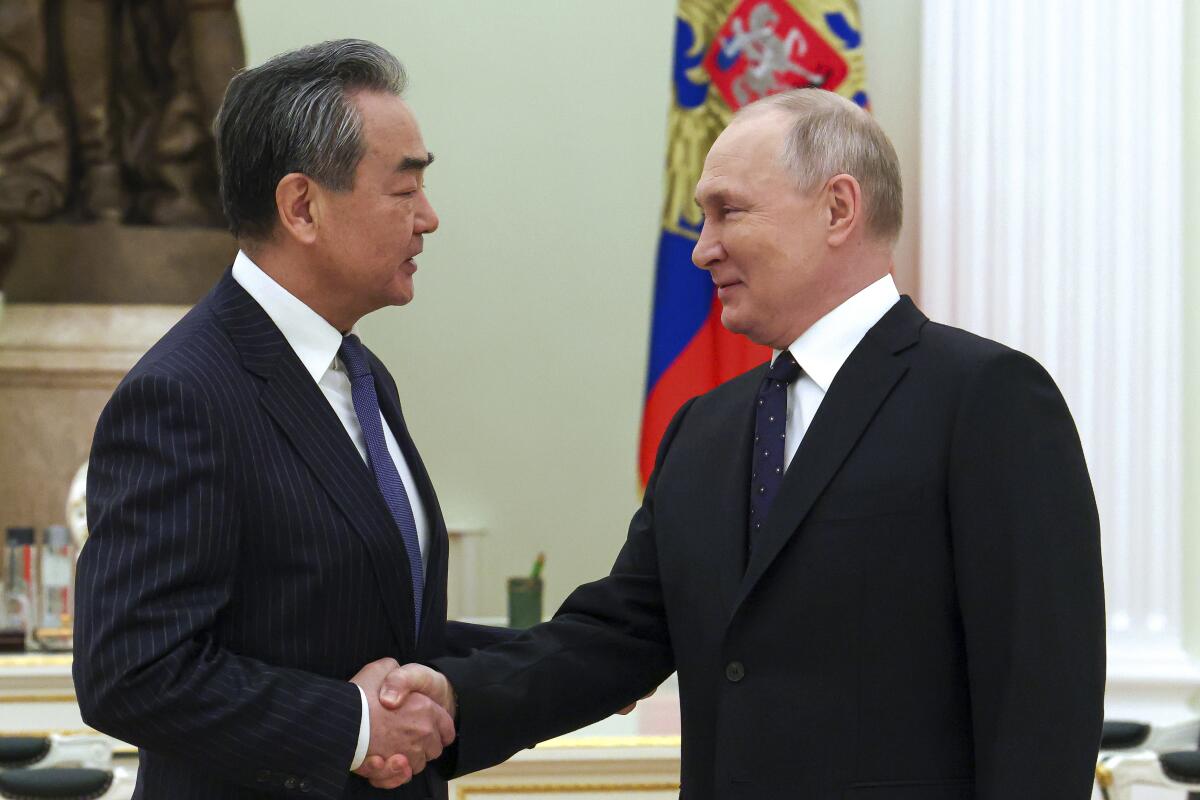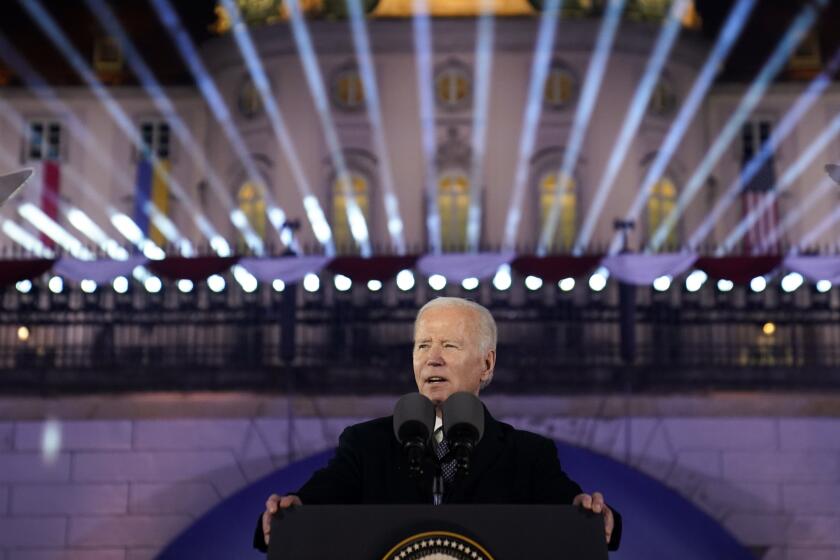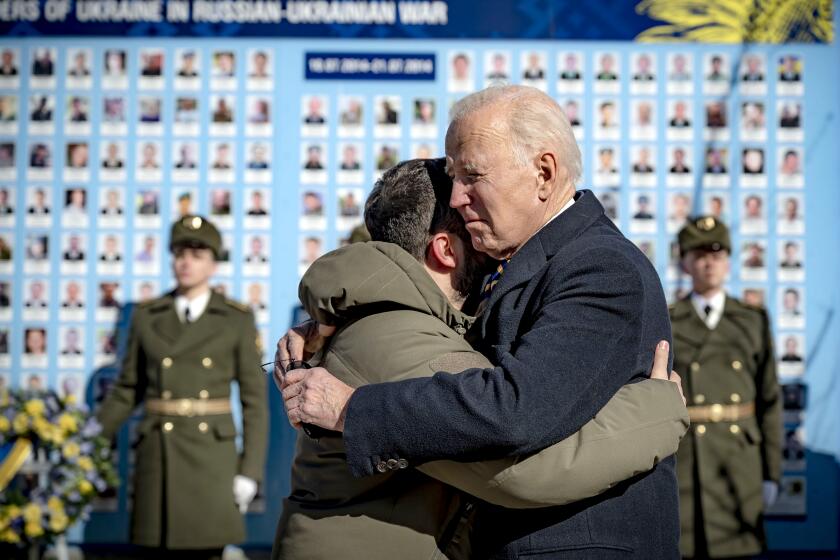News Analysis: Putin leaving nuclear treaty is a reminder that he has — and can use — nuclear bombs

- Share via
WASHINGTON — It seemed to be a scary example of bellicose warmongering foreshadowing a catastrophic escalation. But Russian President Vladimir Putin’s announcement this week that he was abandoning the last major nuclear arms control treaty may have been more symbolic than a threat of concrete action.
Symbolic, but a mighty potent symbol. And one that may signal an end to global arms control agreements.
“Big mistake,” President Biden said Wednesday in Warsaw when asked about Putin’s comments.
At the end of a rambling speech Tuesday on the state of the nation, Putin said Russia was “suspending” its participation in the New START treaty, a 2011 pact in which Russia and the United States agreed to limits on strategic offensive arms, including the deployment of intercontinental ballistic missiles and nuclear warheads. The treaty allows each country to have about 1,500 nuclear weapons.
Early in the Biden administration, Washington and Moscow agreed to extend the New START treaty until Feb. 4, 2026. U.S. officials call it the “bedrock” of global nuclear arms control.
A suspension, as Putin called it, is typically a prelude to complete withdrawal. But it is not fully clear what Putin intended. After his speech, the Russian Foreign Ministry said Russia would not deploy additional strategic nuclear weapons beyond the caps set in the treaty.
On Wednesday, the Russian parliament, the Duma, voted unanimously to ratify the decision to suspend participation in the treaty, saying it would be up to the president to decide whether to resume compliance, the Russian news agency Tass reported.
President Biden delivered a forceful speech Tuesday in Poland ahead of the first anniversary of the Russian invasion of Ukraine.
Yet as the New START treaty faces possible death, it is becoming increasingly clear that the decades-long era of international arms control pacts may also be fading — at a time when nuclear-armed North Korea is asserting itself with numerous missile tests and Iran is moving ahead in its efforts to develop weapons-grade uranium, a main component in nuclear bombs.
Even without the war in Ukraine, it was going to be difficult for Moscow and Washington to agree to a future START pact due to likely Russian demands, said Jeffrey Edmonds, a research scientist in Russia studies at the Center for Naval Analyses. Putin’s suspension is important and worrying, but not yet too ominous, he said.
“I don’t know that it means Russia is going to suddenly run off and start producing a tremendous number of ICBMs,” Edmonds said Wednesday during a panel discussion held by the Center for a New American Security. “That’s very costly and it’s not clear what the use for that would be. ... We have the flexibility to respond to what the Russians are doing.”
Perhaps most important, at least in the short term, is that the announcement was a way for Putin to remind his adversaries that he has and can use nuclear bombs as he wages Europe’s deadliest conflict since World War II.
Putin’s speech “is not really about using nuclear weapons. It is about using nuclear threats,” nuclear control expert Joseph Cirincione, former president of the Ploughshares Fund nonproliferation group, wrote in an opinion piece.
“He has to convince Western publics that they risk nuclear war by continuing to aid Ukraine,” he said separately on MSNBC.
Secretary of State Antony J. Blinken said the U.S. would “wait to see” what Russia actually does, given the theatrics of many statements from the Kremlin.
Even as air-raid sirens wailed, Biden met with Ukraine’s leader to pledge continued U.S. support, both moral and material, for Kyiv against Russia.
Daryl Kimball, executive director of the Arms Control Assn., a Washington-based nonproliferation organization, noted that Russia had already violated the New START agreement by shunning the resumption of required inspections, which were suspended at the beginning of the COVID-19 pandemic, and by refusing to exchange data on nuclear stockpiles. And earlier this year, Russian officials failed to attend a meeting with their U.S. counterparts to discuss START provisions.
Putin, Kimball said, was saying, “I’m going to express my displeasure with the West.” But if Putin actually released his nuclear arsenal, it “would lead to a numerical arms race that neither side can afford,” he added.
Nevertheless, if the Russian leader is only threatening for effect, the gesture still is not a “blip on the radar,” Kimball said. The move comes at a time of decreasing control on nuclear arsenals worldwide — there are few constraints on China, North Korea, Pakistan and a number of other nuclear-armed states.
In Russia, the protocol for Putin or any president to launch a nuclear weapon is similar to the procedure in the U.S. Putin would have to issue an order to do so and the military would have to execute it. In theory, members of the military could question the order, but that would seem an extremely unlikely challenge to the Kremlin.
Putin made veiled threats in the early days after he invaded Ukraine nearly a year ago, launching a war that has claimed thousands of Ukrainian and Russian lives and displaced millions from their homes. His intention was to dissuade the U.S. and other NATO member states from arming Ukraine. That mission failed spectacularly.
Several analysts said Putin would be tempted to use nuclear weapons only if he were convinced he was losing the war, his forces were on the brink of being routed and driven out of Ukraine, and he was about to lose Crimea, the valued peninsula on southern Ukraine’s Black Sea coast, which Russia occupied and illegally annexed in 2014.
Not only would launching a nuclear weapon be disastrous for the parts of the world targeted and invite a response of unprecedented force, it would also hurt Putin domestically and politically, perhaps leading to his overthrow. These possibilities are deterrents for Putin.
“I see this as a clear signal from Putin to Biden that he did not appreciate his visit to Kyiv,” said Sharon Ann Squassoni, a professor of international affairs at George Washington University and former arms control official at the State Department.
Biden’s feat of an unannounced visit to Kyiv, where he strolled city streets with Ukrainian President Volodymyr Zelensky, was a poke in the eye to Putin, who a year ago thought he would be able to roll into the capital and take over the country within weeks of the invasion.
While his treaty suspension doesn’t mean Putin is going to start down a nuclear path, Squassoni said, “the frustration from the U.S. is that it’s yet another channel closed shut where we could have communicated with Russia.”
On Wednesday, Putin played host to China’s foreign minister, Wang Yi, a signal of the ever-closer relationship between Moscow and Beijing amid concerns voiced by U.S. officials that China is considering providing “lethal aid” to Russia.
Last year, just before the war in Ukraine began, Putin and Chinese President Xi Jinping signed a pact of “limitless” cooperation. Xi has since been reluctant to profess full support for Russia in its war against Ukraine.
Now, however, U.S. officials say they have new intelligence showing China has shifted to providing Russia with some of the weapons it desperately needs as its own production capacity falters.
More to Read
Sign up for Essential California
The most important California stories and recommendations in your inbox every morning.
You may occasionally receive promotional content from the Los Angeles Times.













